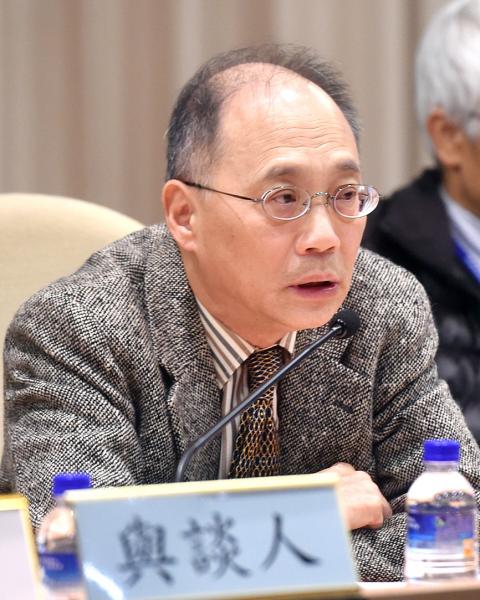INTERVIEW
The Act on Promoting Transitional Justice (促進轉型正義條例), which was passed on Tuesday, is a move toward a mature democracy and not about exacting revenge, Academia Historica director Wu Mi-cha (吳密察) said in a recent interview with the Liberty Times (the sister newspaper of the Taipei Times).
The Executive Yuan is required by law to establish an ad hoc committee to implement transitional justice measures set forth under the law, including the retrieval of political archives held by the Chinese Nationalist Party (KMT), which could significantly add to the understanding of the era.

Photo: Chien Jung-fong, Taipei Times
According to the law, political parties and affiliated organizations are obligated to hand over archives determined by the committee to be national archives or face a fine of between NT$1.5 million and NT$5 million (US$49,975 and US$166,583). The fine can be repeated if necessary.
Wu said the KMT should respond to the act by drawing on historical records in its possession to show that the party has changed.
The act is an important part of Taiwan’s democratization and liberalization processes, Wu said, adding that the Democratic Progressive Party was unable to promote the act when it first came to power in 2000, as it did not have a majority in the legislature.
The KMT showed no interest in promoting transitional justice when they returned to office in 2008, despite claiming to be different from the KMT of the past, he added.
Whether the act can be successfully implemented now will be a test of the maturity of the nation’s democracy, Wu said, adding that a democracy that is defined merely as the election of one out of a few individuals is not a good democracy.
“If this is done well, then no individual or party will be held accountable for past crimes,” Wu said.
Many KMT party members today rely on the support of local constituencies, and there is no need for them to bear the burden of the party’s past crimes, he said, adding that, conversely, the KMT can borrow from the impetus of the transitional justice process and win support by showing commitment to its efforts.
Reports that government divisions made to the central government during the authoritarian period provide important records of the time, Wu said, citing communications between the then-Taiwan Province governor and the central government in China’s Nanjing during the 228 Incident.
The public also has yet to see documents detailing the “blacklisting” of some overseas Taiwanese students by the KMT, he said, adding that such documents would have been kept by the party’s overseas affiliate organizations at the time.
Wu said that many overseas students of the time found themselves unable to enter public universities or the Academia Sinica upon returning to Taiwan, even when their academic records had passed inspection.
Collecting and making public the records of those blacklisted students, which are spread out among various organizations, would provide a more complete historical picture, he said.
“In any nation where public records are hidden away or destroyed, people are going to be distrustful of the government,” Wu said.
“Therefore, it is imperative that whatever organization is tasked with managing government documents has the public’s trust,” Wu said, adding: “Document declassification processes must be transparent and systematic, with progress and access restrictions being clearly explained.”
The process of accessing government records must be simple to reduce public distrust, Wu said.

Alain Robert, known as the "French Spider-Man," praised Alex Honnold as exceptionally well-prepared after the US climber completed a free solo ascent of Taipei 101 yesterday. Robert said Honnold's ascent of the 508m-tall skyscraper in just more than one-and-a-half hours without using safety ropes or equipment was a remarkable achievement. "This is my life," he said in an interview conducted in French, adding that he liked the feeling of being "on the edge of danger." The 63-year-old Frenchman climbed Taipei 101 using ropes in December 2004, taking about four hours to reach the top. On a one-to-10 scale of difficulty, Robert said Taipei 101

Nipah virus infection is to be officially listed as a category 5 notifiable infectious disease in Taiwan in March, while clinical treatment guidelines are being formulated, the Centers for Disease Control (CDC) said yesterday. With Nipah infections being reported in other countries and considering its relatively high fatality rate, the centers on Jan. 16 announced that it would be listed as a notifiable infectious disease to bolster the nation’s systematic early warning system and increase public awareness, the CDC said. Bangladesh reported four fatal cases last year in separate districts, with three linked to raw date palm sap consumption, CDC Epidemic Intelligence

Two Taiwanese prosecutors were questioned by Chinese security personnel at their hotel during a trip to China’s Henan Province this month, the Mainland Affairs Council (MAC) said yesterday. The officers had personal information on the prosecutors, including “when they were assigned to their posts, their work locations and job titles,” MAC Deputy Minister and spokesman Liang Wen-chieh (梁文傑) said. On top of asking about their agencies and positions, the officers also questioned the prosecutors about the Cross-Strait Joint Crime-Fighting and Judicial Mutual Assistance Agreement, a pact that serves as the framework for Taiwan-China cooperation on combating crime and providing judicial assistance, Liang

US climber Alex Honnold left Taiwan this morning a day after completing a free-solo ascent of Taipei 101, a feat that drew cheers from onlookers and gained widespread international attention. Honnold yesterday scaled the 101-story skyscraper without a rope or safety harness. The climb — the highest urban free-solo ascent ever attempted — took just more than 90 minutes and was streamed live on Netflix. It was covered by major international news outlets including CNN, the New York Times, the Guardian and the Wall Street Journal. As Honnold prepared to leave Taiwan today, he attracted a crowd when he and his wife, Sanni,